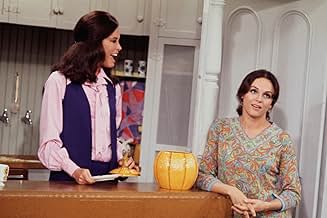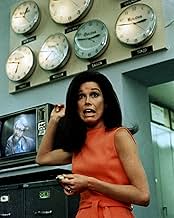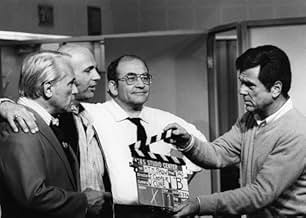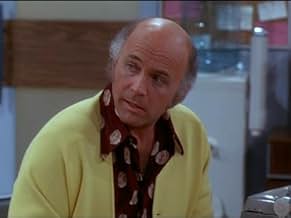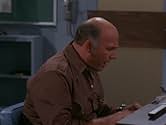La vie et les épreuves d'une jeune femme célibataire et de ses amis, tant sur le plan professionnel que familial.La vie et les épreuves d'une jeune femme célibataire et de ses amis, tant sur le plan professionnel que familial.La vie et les épreuves d'une jeune femme célibataire et de ses amis, tant sur le plan professionnel que familial.
- A remporté 29 prix Primetime Emmy
- 46 victoires et 82 nominations au total
Parcourir les épisodes
Avis en vedette
"The Mary Tyler Moore Show" is absolutely my FAVORITE television show of all time, with "The Dick Van Dyke Show" falling a hair behind. I love all the characters of the MTM show...they all had great lines, and those actors knew how to deliver. Mary Tyler Moore exemplified true sportsmanship in making this whole show a wonderful example of COMPLETE ensemble acting. Every character had his/her shining moments, time and time again. I was about nine when this show debuted, and truly grew up with it. I used to hate Ted, because he was so unbelievably stupid. However, now that I've spent twenty or so years in the work world, I have had the complete displeasure of working with Ted Baxters everywhere....so many who rise to their level of complete incompetence. And over the years, in watching reruns, I have come to fully appreciate Ted Knight's genius in his portrayal of Ted Baxter. The episode in which Mary is simply feeling completely down in the dumps...her motivation is gone for no apparent reason, other than the fact that she has hit a slump (a "new apartment" episode). Ted Knight's portrayal of Ted Baxter imitating her in her slumpy condition, and repeating the whole scene with identical dialog but with a completely different attitude, basically showing Mary that she has to appreciate what she has in life, and look at it all with a different, positive perspective, was sheer comedic genius at its finest.
The final episode of this series portrayed my comment about Corporate America very realistically, and the episode itself is one for a time capsule....just bottle it up. Ditto for the "Chuckles the Clown" episode...and for the "Veal Prince Orloff" episode. Actually, I'd love to put all of MTM's episodes, along with those from the Dick Van Dyke Show, in a time capsule and send them into space. Nick at Nite should run episodes only from MTM, the Dick Van Dyke Show, Bob Newhart, and The Wonder Years. That is all that that station needs, and I'm sure that the ratings would go through the roof. But back to Mary....her show was a brilliant gem that graced the world of American television, and no other show will ever hold a candle to it....EVER. Yes, Seinfeld was funny, and "breakthrough", in being a show about nothing, and it even offered phrases that entered our vernacular. But it missed the one key element that MTM had in spades...heart. The Seinfeld show, as funny as it always was, really never made you cry or pulled at your heart strings...ever (other than maybe making you cry from laughter). The MTM Show, on the other hand, combined humor, drama, reality, the absurd, the sublime, and a lot of warmth all rolled into one magnificent, shining, seven-year love-fest for our pop culture, and I thank Mary for giving us this bright light. In a comic strip that was published I believe just the Sunday after the last episode aired, a man was depicted throwing his television set out his window, crying. The cartoonist captured the national sentiment quite beautifully. I miss Mary and her gang to this day. Thank goodness for the complete DVD set.
The final episode of this series portrayed my comment about Corporate America very realistically, and the episode itself is one for a time capsule....just bottle it up. Ditto for the "Chuckles the Clown" episode...and for the "Veal Prince Orloff" episode. Actually, I'd love to put all of MTM's episodes, along with those from the Dick Van Dyke Show, in a time capsule and send them into space. Nick at Nite should run episodes only from MTM, the Dick Van Dyke Show, Bob Newhart, and The Wonder Years. That is all that that station needs, and I'm sure that the ratings would go through the roof. But back to Mary....her show was a brilliant gem that graced the world of American television, and no other show will ever hold a candle to it....EVER. Yes, Seinfeld was funny, and "breakthrough", in being a show about nothing, and it even offered phrases that entered our vernacular. But it missed the one key element that MTM had in spades...heart. The Seinfeld show, as funny as it always was, really never made you cry or pulled at your heart strings...ever (other than maybe making you cry from laughter). The MTM Show, on the other hand, combined humor, drama, reality, the absurd, the sublime, and a lot of warmth all rolled into one magnificent, shining, seven-year love-fest for our pop culture, and I thank Mary for giving us this bright light. In a comic strip that was published I believe just the Sunday after the last episode aired, a man was depicted throwing his television set out his window, crying. The cartoonist captured the national sentiment quite beautifully. I miss Mary and her gang to this day. Thank goodness for the complete DVD set.
The backstory: Mary Richards moves to Minneapolis, MN, specifically into an apartment with a sunken in living room. She applies for a job at a local television newsroom with high aspirations. The show not only deals with situation comedy, but with how a woman could "make it after all" in a male dominated workforce. Mary becomes close with her newsroom family, from tough-love boss Lou Grant to bumbling news anchorman Ted Baxter. She also deals with wacky neighbor Phyllis and of course, wise cracking Rhoda. The show is great because you care about all the characters and while funny, it can still deliver a strong message. Truly one of the best shows on television.
As a 25-year-old woman, it's a shame that the so-called "feminist icons" of my day have been klutzy, man-hungry ninny Ally McBeal and tabloid wench Paris Hilton. I've really come to envy women who had real feminist heroes, real or fictional, such as Gloria Steinem, Bea Arthur as "Maude", and, of course, Mary Tyler Moore as Mary Richards. "The Mary Tyler Moore Show" isn't just an excellent sitcom with perfectly realized characters, but it featured an imperfect but winning heroine that any woman could look up to. Mary was a sweet-natured thirty-something who alternated between being high-strung and confident. She happily lived alone and had a loyal gal pal in smart mouthed New Yorker Rhoda (the incomparable Valerie Harper). Mary also was an associate TV producer at the low-rated WJM news network, where she had the respect of her male co-workers, including her arch-conservative boss Lou Grant (Ed Asner), wisecracking but tender-hearted work buddy Murray Slaugher (Gavin McLeod), and buffoonish anchorman Ted Baxter (Ted Knight). Not that everyone loved Mary... she constantly had to deal with her insufferable, overbearingly perky landlady Phyllis (Cloris Leachman). When Phyllis was written out of the show, WJM's "Happy Homemaker" Sue Ann Nivens (flawless Betty White) replaced her as Mary's foil. Passive-aggressive and sex-starved, Sue Ann was a hilarious combination of Blanche from "The Golden Girls" and Harriet Nelson. Best of all, the show had running gags that somehow never went stale: Mary's tendency to attract the wrong men, her disastrous dinner parties, Ted's slips of the tongue on the air, Lou's annoyance at being the lowest-rated TV network, and Rhoda's quest for the perfect husband. An addictive show that didn't wear out its welcome in its seven year run, "MTM" is a shining example of great writing, fully developed characters, and perfect casting that has never been equaled. It was a show with spunk... we need spunk!
It's hard for people to remember what American TV was like at the time (even for people who were alive and conscious then) in the hugely formulaic post-PETTICOAT JUNCTION era.
And I've known a lot of people who today look at the first season of "MTM" where the jokes are broader and don't always quite work and the acting is a bit too "loud" and stagey, and they wonder why this show was so well-regarded, then and now --- often to the point that they can't make it thru to later seasons.
I guess that's understandable. It's hard to believe very-very early episodes of "MTM" about Mary and Rhoda joining a divorce club and its strained humor was actually looser and freer and more amusing than what other sitcoms of the day had to offer. But it's true.
Although the first year of the show may be only sporadically humorous, it makes up for it in that "MTM" did one of the best jobs of capturing that weird melancholy of the era --- that mood that kind of defined the '70s, and was even more intense at the very start of the decade: this sort of lost, disillusioned, bittersweet, post-60s flavor which made everybody immediately seem as if they had a "past" from the moment they appeared on screen...
For anybody looking to see what it actually felt like living in the world at that particular moment in time -- at the cusp of the '60s and '70s -- it's captured vividly by such period montage sequences as the urban street scenes in MIDNIGHT COWBOY (1969) or the snow angels/ice skating sequence in LOVE STORY (1970) or the "MTM" show opening theme design from Season 1, even Mary and little Bess going shopping in a Minneapolis mall, etc...
The world actually felt that way at the time. It's not just a Hollywood construct.
To me, Season 1 of "MTM" is kind of a portal to 1970. I regarded it as such even as early as the late-70s (when the show was first in syndication) and it still hits me the same way whenever I see very early installments--- the look of the show and the forlorn music score... No, the comedy isn't quite as hilarious by the slick standards of sitcoms from more recent decades (or even compared to later episodes of the same show) but I still find the mood almost heart-breakingly captivating. It is so evocative of the era.
As the seasons rolled on, the comedy got sharper (by the standards of the day) even though that '70s somberness was gradually mitigated as it lessened in real life.
So it's a time capsule of sorts... One would think every show and movie filmed in a particular era would be, but that just isn't true. Clothes and cars from a period don't sell or convey the past to the present --- something has to be good, or at least right-minded, in order for the zeitgeist of the era in question to stick to celluloid. And "MTM" was one of those shows that did so.
It was also one of the rare series then to proceed in "real time" which gave the show a life, an energy, that most didn't have, even though it didn't delve into the then-shocking, in-your-face politics that ALL IN THE FAMILY soon would.
Folks who weren't around then probably aren't able to grasp how fresh this "MTM" show seemed back in 1970, given where TV was at the time. Or understand why all the terribly broad (some might even say groan-inducing) comedy directed at, and derived from, Ted Baxter during Season 1 -- which predominantly focused on his dumbness and inability to pronounce basic words -- could possibly ever have been once seen as "funny".
In fact, it was, however briefly, fall-off-the-couch funny. TV in the 1960s had fervently ignored the social changes of that decade (including the questioning of establishment authority) so seeing a revered image like the silver-haired newsreader held up as a buffoon was actually considered edgy, even though that context doesn't really "read" today. (That's not revisionism, I swear. And at least the writers realized they would soon have to write to Ted's narcissism and density in a more layered, sophisticated fashion, and they quickly did so.)
That says more about where the media culture was circa 1969 or 1970 than it does THE MARY TYLER MOORE SHOW.
For all of the above reasons, Mary Richards became metaphorical for the early-to-mid 1970s, almost by accident: TV changed more between 1970 and 1975 than any other five year period in its history, in terms of content, and the television sitcom genre had literally become an agent for social change. And Mary Richards likewise grew during the seven years of the series from the quivery, vulnerable, lanky girl with the long, raven hair who let herself be gently bullied into giving up her family holiday visit at Christmas to cover for her co-workers in that 1970 episode (so wistfully forlorn for reasons hard to explain, except that it, too, captures the poignant atmosphere of the time precisely) into the almost cocky, seasoned professional who didn't pause to deliver a zinger to Ted or SueAnn when circumstances demanded it, and could grab and kiss her latest boyfriend in a public restaurant and then fluff her hair tauntingly at her voyeuristic co-workers as she sauntered out the front door.
Mary had grown up with us, or at least with the television medium, during it's most significant period of progression.
And then there's the actress herself, Mary Tyler Moore, whose own personal melancholia seemed to parallel that of the earlier part of that decade. Even with the same writers and co-stars, the show would never have felt the same without Moore and her intrinsic sense of haunted, detached nostalgia wrapped in winter's chill.
And I've known a lot of people who today look at the first season of "MTM" where the jokes are broader and don't always quite work and the acting is a bit too "loud" and stagey, and they wonder why this show was so well-regarded, then and now --- often to the point that they can't make it thru to later seasons.
I guess that's understandable. It's hard to believe very-very early episodes of "MTM" about Mary and Rhoda joining a divorce club and its strained humor was actually looser and freer and more amusing than what other sitcoms of the day had to offer. But it's true.
Although the first year of the show may be only sporadically humorous, it makes up for it in that "MTM" did one of the best jobs of capturing that weird melancholy of the era --- that mood that kind of defined the '70s, and was even more intense at the very start of the decade: this sort of lost, disillusioned, bittersweet, post-60s flavor which made everybody immediately seem as if they had a "past" from the moment they appeared on screen...
For anybody looking to see what it actually felt like living in the world at that particular moment in time -- at the cusp of the '60s and '70s -- it's captured vividly by such period montage sequences as the urban street scenes in MIDNIGHT COWBOY (1969) or the snow angels/ice skating sequence in LOVE STORY (1970) or the "MTM" show opening theme design from Season 1, even Mary and little Bess going shopping in a Minneapolis mall, etc...
The world actually felt that way at the time. It's not just a Hollywood construct.
To me, Season 1 of "MTM" is kind of a portal to 1970. I regarded it as such even as early as the late-70s (when the show was first in syndication) and it still hits me the same way whenever I see very early installments--- the look of the show and the forlorn music score... No, the comedy isn't quite as hilarious by the slick standards of sitcoms from more recent decades (or even compared to later episodes of the same show) but I still find the mood almost heart-breakingly captivating. It is so evocative of the era.
As the seasons rolled on, the comedy got sharper (by the standards of the day) even though that '70s somberness was gradually mitigated as it lessened in real life.
So it's a time capsule of sorts... One would think every show and movie filmed in a particular era would be, but that just isn't true. Clothes and cars from a period don't sell or convey the past to the present --- something has to be good, or at least right-minded, in order for the zeitgeist of the era in question to stick to celluloid. And "MTM" was one of those shows that did so.
It was also one of the rare series then to proceed in "real time" which gave the show a life, an energy, that most didn't have, even though it didn't delve into the then-shocking, in-your-face politics that ALL IN THE FAMILY soon would.
Folks who weren't around then probably aren't able to grasp how fresh this "MTM" show seemed back in 1970, given where TV was at the time. Or understand why all the terribly broad (some might even say groan-inducing) comedy directed at, and derived from, Ted Baxter during Season 1 -- which predominantly focused on his dumbness and inability to pronounce basic words -- could possibly ever have been once seen as "funny".
In fact, it was, however briefly, fall-off-the-couch funny. TV in the 1960s had fervently ignored the social changes of that decade (including the questioning of establishment authority) so seeing a revered image like the silver-haired newsreader held up as a buffoon was actually considered edgy, even though that context doesn't really "read" today. (That's not revisionism, I swear. And at least the writers realized they would soon have to write to Ted's narcissism and density in a more layered, sophisticated fashion, and they quickly did so.)
That says more about where the media culture was circa 1969 or 1970 than it does THE MARY TYLER MOORE SHOW.
For all of the above reasons, Mary Richards became metaphorical for the early-to-mid 1970s, almost by accident: TV changed more between 1970 and 1975 than any other five year period in its history, in terms of content, and the television sitcom genre had literally become an agent for social change. And Mary Richards likewise grew during the seven years of the series from the quivery, vulnerable, lanky girl with the long, raven hair who let herself be gently bullied into giving up her family holiday visit at Christmas to cover for her co-workers in that 1970 episode (so wistfully forlorn for reasons hard to explain, except that it, too, captures the poignant atmosphere of the time precisely) into the almost cocky, seasoned professional who didn't pause to deliver a zinger to Ted or SueAnn when circumstances demanded it, and could grab and kiss her latest boyfriend in a public restaurant and then fluff her hair tauntingly at her voyeuristic co-workers as she sauntered out the front door.
Mary had grown up with us, or at least with the television medium, during it's most significant period of progression.
And then there's the actress herself, Mary Tyler Moore, whose own personal melancholia seemed to parallel that of the earlier part of that decade. Even with the same writers and co-stars, the show would never have felt the same without Moore and her intrinsic sense of haunted, detached nostalgia wrapped in winter's chill.
I always enjoyed The Mary Tyler Moore Show. The characters were all funny, especially the goofy fights between Ted Baxter and Murray Slaughter. Lou Grant ("I hate spunk!") was always good for a laugh, especially the episode where he ended up drunk on Mary's doorstep!
Of course, the real two stars of the series were Mary Tyler Moore (duh) as Mary Richards and Valerie Harper as her best friend, Rhoda Morgenstern. My all-time favorite episode is the second one, where the two host a small gathering at Mary's apartment for two potential suitors, and everything goes wrong!
A true classic, and it earned every Emmy it got.
Of course, the real two stars of the series were Mary Tyler Moore (duh) as Mary Richards and Valerie Harper as her best friend, Rhoda Morgenstern. My all-time favorite episode is the second one, where the two host a small gathering at Mary's apartment for two potential suitors, and everything goes wrong!
A true classic, and it earned every Emmy it got.
Le saviez-vous
- AnecdotesProducers wanted "someone like Betty White" to play Sue Ann Nivens. Eventually, someone asked, "Why not cast Betty White?"
- GaffesIn the first season installment "Divorce Isn't Everything", Mary mentions that she can't speak French but can speak Spanish. Later in the series, while at a Mexican restaurant, she indicates that she can't read the menu because she took French in college.
- Citations
Lou Grant: You know, Mary, you've got spunk.
Mary Richards: Why, thank you, Mr. Grant.
Lou Grant: I hate spunk.
- Générique farfeluIn episode 71 the MTM Kitten was replaced by Miss Moore herself, saying "Th-th-th-that's all folks!", a line spoken by Mary Richards during that episode.
- ConnexionsFeatured in The 23rd Annual Primetime Emmy Awards (1971)
Meilleurs choix
Connectez-vous pour évaluer et surveiller les recommandations personnalisées
- How many seasons does The Mary Tyler Moore Show have?Propulsé par Alexa
Détails
- Durée30 minutes
- Couleur
- Rapport de forme
- 4:3
Contribuer à cette page
Suggérer une modification ou ajouter du contenu manquant

Lacune principale
By what name was Les ennuis de Marie (1970) officially released in India in Hindi?
Répondre





